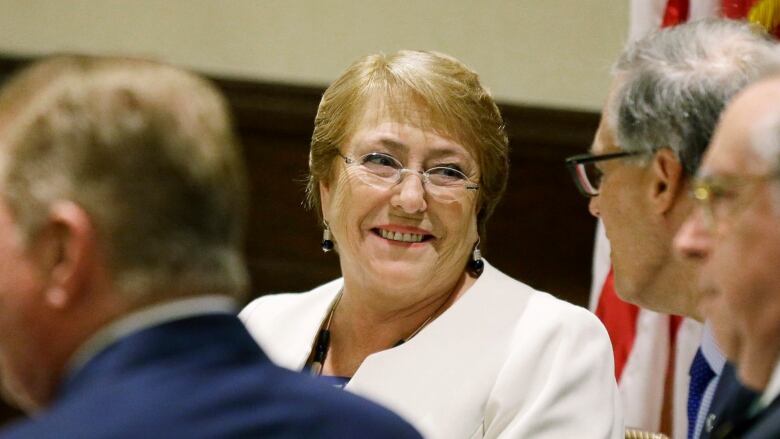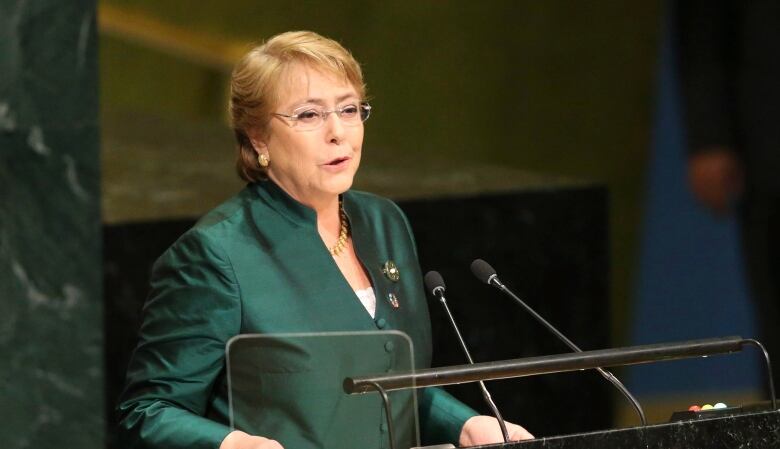UN approves Chile's Bachelet as new human rights chief
Torture survivor Michelle Bachelet was her countrys 1st female president

The UNGeneral Assembly has approved Chile's former president Michelle Bachelet as the next UNhuman rights chief by consensus.
Diplomats in theGeneral Assembly unanimously voted on Friday to appointBachelet. After the vote, UN Secretary General Antonio Guterres touted her qualifications: the first female president of Chile, first head of the gender equality agency known as UN Women, "a survivor of brutality" by a Chilean dictator, and a physician who understands people's thirst for health and economic and social rights.
She has also "lived under the darkness of dictatorship," he said.
Deeply humbled and honored to announce my acceptance as the @UNs new High Commissioner for Human Rights. I thank Secretary General @antonioguterres and the General Assembly for entrusting me this important task.
—@mbacheletBachelet's father was imprisoned for treason for opposing the coup that ousted Chile's leftistpresident Salvador Allende in September 1973. She and her mother were tortured in a secret prison for two weeks before they fled into exile. Her father, Gen. Alberto Bachelet, died of cardiac arrest following months of torture.
Guterres told reporters Bachelet will take office "at a time of grave consequence for human rights."
"Hatred and inequality are on the rise," he said. "Respect for international humanitarian and human rights law is on the decline. Space for civil society is shrinking. Press freedoms are under pressure."
First taste of challenges to come
But some of the pressures that Bachelet will face were immediately evident in several speeches following her approval by the General Assembly. Sharp exchanges between the United States and several key opponents over rights abuses may be Bachelet'sfirst taste of some of the issues she will confront in her new role.
U.S. minister-counsellor Stefaine Amadeo, speaking on behalf of the UN's host country, said "it is incumbent" on Bachelet to avoid what the United States called the failure of the UNhuman rights system.
She singled out the Geneva-based Human Rights Council's "consistent failure to address extreme human rights abuses in the Western hemisphere, in Venezuela and Cuba in particular." She also cited UNfailures "to adequately address major human rights crises" in Iran, North Korea and Congo.
Mohammad Hassani Nejad, a counsellor in Iran's UNmission, retorted that the high commissioner for human rights should speak out "for all victims," citing "migrant kids in cages, or the U.S.-made bombs that kill kids on a daily basis."
Cuba's deputy UNambassador, Ana Silvia Rodriguez, echoed Nejad in speaking out against the polarization and politicization of human rights.
She accused the U.S. of "flagrantly" violating human rights by imposing an economic and financial embargo on Cuba for decades, separating migrant parents and children and causing civilian deaths "by bombs and drone wars," as well as by "brutality and police abuse, particularly against the African-American population."
UN chief says Chile's Michelle Bachelet takes on her new role as @UNHumanRights chief at a time when - hatred & inequality are on the rise. Respect for int'l humanitarian & human rights law are on the decline. Civil society space is shrinking& press freedoms are 'under pressure'
—@KentUNCBCVenezuela's U.N. Ambassador Samuel Moncada said his country will only believe the United States supports human rights when it stops separating Latin American children and parents, stops using drones and "claiming the use of torture as legitimate practice," ends discrimination against the people of Puerto Rico, and "stops insulting entire nations."
As for Bachelet, Moncada said, "she will be facing a very powerful force in the next few years."
Amadeo, the American diplomat, then took the floor saying the United States "notes with disappointment the incorrect misconstructions, fabrications and false criticism of the delegations of Cuba and Venezuela."
Replaces outspoken predecessor
Bachelet will replace Zeid Ra'ad Al-Hussein, a Jordanian diplomat and member of the country's royal family, whose four-year term ends Aug. 31.
Secretary General Gutteres paid tribute to Zeid Friday "for his leadership, passion, courage and skill" as high commissioner.
Zeid, who faced criticism from many quarters for being too outspoken,announced last December that he would not seek a second term.

"Next year will be the last of my mandate,"Zeidwrote in an email to his staff, which was subsequently obtained by a number of media organizations."After reflection, I have decided not to seek a second four-year term. To do so, in the current geopolitical context, might involve bending a knee in supplication; muting a statement of advocacy; lessening the independence and integrity of my voice which is your voice."
Last week, he told a farewell news conferencethat his office doesn't "bring shame on governments, they shame themselves."
He stressed that "silence does not earn you any respect none."
With files from CBC News












_(720p).jpg)


 OFFICIAL HD MUSIC VIDEO.jpg)
.jpg)



























































































